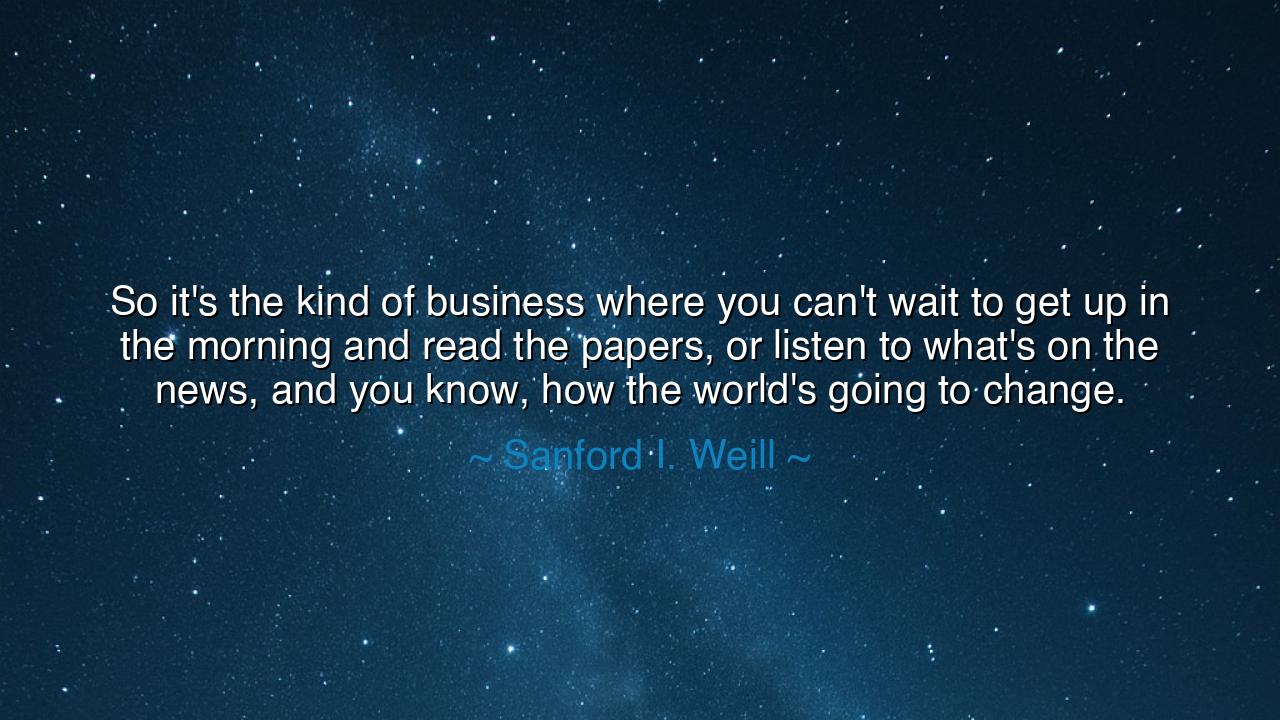
So it's the kind of business where you can't wait to get up in
So it's the kind of business where you can't wait to get up in the morning and read the papers, or listen to what's on the news, and you know, how the world's going to change.






The words of Sanford I. Weill, when he declared, “So it's the kind of business where you can't wait to get up in the morning and read the papers, or listen to what's on the news, and you know, how the world's going to change”, shine like an ember of truth in the heart of those who labor in the realm of commerce, finance, and the shaping of nations. In this utterance, there lies not just a description of a trade, but the spirit of a calling. He spoke not merely of business, but of a life driven by the pulse of the world itself, where every dawn brings with it the chance to glimpse destiny unfolding in the news of the hour.
Consider the weight of his meaning: there are labors that weary the soul, where morning feels like a burden and the day stretches long in shadow. But there are also callings, those blessed tasks wherein the soul leaps from its slumber, eager to seize the day’s tidings. For those who walk in this path, each sunrise is not repetition but revelation, a promise that the world will unveil itself anew, and in that unveiling lies opportunity, transformation, and purpose. Such is the business he describes—one tied not to monotony but to the living breath of history.
The ancients themselves knew this truth. Did not Alexander, son of Philip, rise each morning eager to hear of the lands yet unconquered, the maps yet unfinished, the horizons yet unseen? To him, each report of distant kingdoms was not idle curiosity, but a summons to action. In his hunger for the unknown, he mirrored the spirit that Weill speaks of: a passion to read the news of the world and to answer it with daring deeds. And though centuries have passed, the fire that drove Alexander to march eastward is the same flame that drives those in modern halls of commerce to awaken and wonder how the day’s headlines will change their fates.
But let us not deceive ourselves: such eagerness is not born of idleness or shallow amusement. It comes from a soul that feels bound to the destiny of mankind. When Weill speaks of the thrill of news, he is not praising gossip nor idle chatter, but the sacred awareness that each shift in the winds of politics, each tremor in the markets, each upheaval in society, is a chance to shape the future. Those who live in this way do not merely observe the world—they strive to become instruments of its transformation.
Consider the example of Franklin D. Roosevelt during the Great Depression. Each morning, the newspapers cried out with despair: banks failing, men jobless, families hungry. Yet Roosevelt did not cower before the tide. He rose, read the bitter news, and declared that such suffering must not remain. With the New Deal, he answered the world’s groaning with deeds, proving that the morning’s grim tidings can ignite the will to build new structures of hope. This is the spirit of Weill’s teaching: that to love the business of life is to read even the darkest headlines with resolve, asking not “Why is this so?” but “What may I do?”
The lesson is clear: seek a path, a work, a calling, in which the dawn awakens you with joy rather than dread. Do not bind yourself to labors that suffocate your fire. Instead, pursue endeavors where your heart burns to know what the day has brought forth, for in such work lies both power and peace. To live thus is to align your own rhythm with the rhythm of the world, so that your actions are not isolated strokes, but notes in the grand song of history.
Let this be your practice: when you rise each morning, do not plunge first into distraction, but pause and ask, “How will the world change today, and how shall I answer?” Read, listen, observe with the eyes of one entrusted with a mission. Take one step—small though it may be—that draws you closer to shaping the world rather than being shaped by it. For the true life, as Weill reminds us, is not to endure the march of time passively, but to rise joyfully with the dawn, eager to engage with the ever-turning wheel of the world.
Thus the quote becomes more than words; it is a summons. A summons to live awake, to live engaged, and to rise with each sunrise ready to meet the fate of nations and the needs of men. Those who follow this wisdom will never wake in despair, but will greet the morning as allies of destiny itself.






AAdministratorAdministrator
Welcome, honored guests. Please leave a comment, we will respond soon